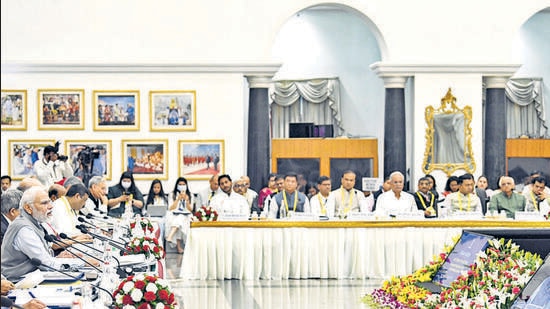GST compensation, disaster fund states’ top demands at Niti Aayog meet
While Chhattisgarh chief minister Bhupesh Baghel pointed at the loss of revenue to states due to the GST tax system which came into force in July 2017, his West Bengal counterpart, Mamata Banerjee, said state governments should not be pressurised to implement the National Education Policy (NEP).
Issues related to minimum support price (MSP) of crops, support to states in dealing with natural disasters, crop insurance and a five-year extension for compensation paid to states for revenue shortfall due to implementation of goods and services tax (GST) — these were among issues that were raised by chief ministers of various states at the 7th meeting of the NITI Aayog’s Governing Council chaired by Prime Minister Narendra Modi on Sunday.

While Chhattisgarh chief minister Bhupesh Baghel pointed at the loss of revenue to states due to the GST tax system which came into force in July 2017, his West Bengal counterpart, Mamata Banerjee, said state governments should not be pressurised to implement the National Education Policy (NEP).
At the meeting, Baghel said there has been a loss of revenue to states due to the GST system and that Centre had not made arrangements to compensate the loss of revenue of about ₹5,000 crore. “So the GST compensation grant should be continued for the next five years after June 2022,” a statement issued by the chief minister’s office (CMO) said.
Also Read | India's federal structure became role model during Covid: PM Modi at NITI Aayog meet
Meanwhile, Chhattisgarh government officials claimed the state’s Godhan Nyay Yojana, under which the state government acquires cow dung from farmers, was appreciated by Prime Minister Narendra Modi during the meeting.
Kerala chief minister Pinarayi Vijayan also drew the attention of the council to various GST related issues and said there needs to be a review of the decision to impose the tax on essential items. He also requested that the GST compensation to the states be continued for another five years.
West Bengal chief minister Banerjee called for “greater cooperation” between the Centre and the states, according to people familiar with the matter. She also emphasised that the Centre should look into the demands of the state governments “more seriously” and no policies should be forced on them.
State governments should not be pressurised to implement the National Education Policy, she said.
Speaking in the same vein, Vijayan said the Centre should not go against the federal structure of the Constitution and legislation on subjects listed in its concurrent list should be carried out in consultation with the states. The central government should refrain from making laws on matters in the State list of the Constitution, he said.
Goa chief minister Pramod Sawant, however, said his government will implement a hundred per cent of the syllabus in higher education institutes along the lines of the NEP from the next academic year.
“We have started working on the implementation of the National Education Policy in the state. The implementation has already begun in the state-run and aided schools,” an official release quoted Sawant as saying.
He also stressed on the state’s efforts at crop diversification. “We are also insisting that pulses and oil seeds be cultivated as part of crop diversification,” he said.
Punjab chief minister Bhagwant Mann raised the issue of granting a legal guarantee for MSP on crops to safeguard the interest of farmers. The Aam Aadmi Party (AAP) leader also urged the Centre to ensure a foolproof marketing system for alternative crops.
Odisha chief minister Naveen Patnaik alleged that the state has been historically neglected in areas such as telecom, railways and banking and sought the Centre’s special focus in those sectors.
“We have the lowest density in all these crucial infrastructures and I would urge the central government to give special focus for Odisha,” Patnaik said.
The chief minister also pointed out how the state is impacted almost every year by natural disasters. “As we all know, Odisha is impacted almost every year by natural disasters. It’s important to have disaster resilient infrastructure to protect the state and its people from the vagaries of nature. I would sincerely request the central government to make Odisha a special focus state and allocate funds for disaster proofing,” he said.
At the meeting, Uttar Pradesh chief minister Yogi Adityanath reiterated his government’s resolve to make the state a $1 trillion ( ₹80 lakh crore) economy in the next five years.
“To make Uttar Pradesh a one trillion dollar ( ₹80 lakh crore) economy by 2025, our cities will have to come forward as a growth engine by attracting investments and increasing employment generation. Urban development has to be a growth engine as well as address the challenges of housing/slums, water supply and solid waste management, air quality/pollution, livelihood and public transport,” he said.
Adityanath’s Uttarakhand counterpart, Pushkar Singh Dhami said the NITI Aayog should make a model of development through science and technology, which is based on ecology, population, and environmental sensitivity, in the Himalayan states. A special seminar should be organised for Himalayan states under the leadership of the Prime Minister, he said, according to a press release.
Several chief ministers also shared inputs on the work the respective governments have carried out in the past few years.
(With agency inputs)






